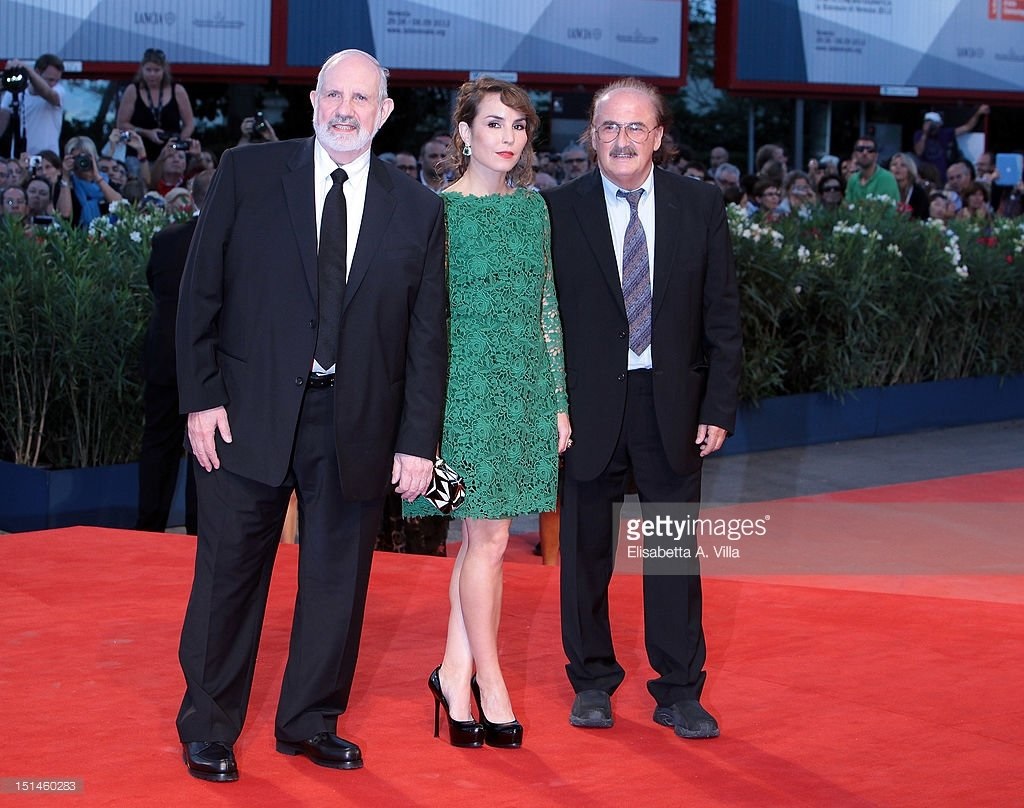SISTERS, ALREADY ON THE CHANNEL WITH BONUS EXTRAS, WILL BE PART OF "ART-HOUSE HORROR"
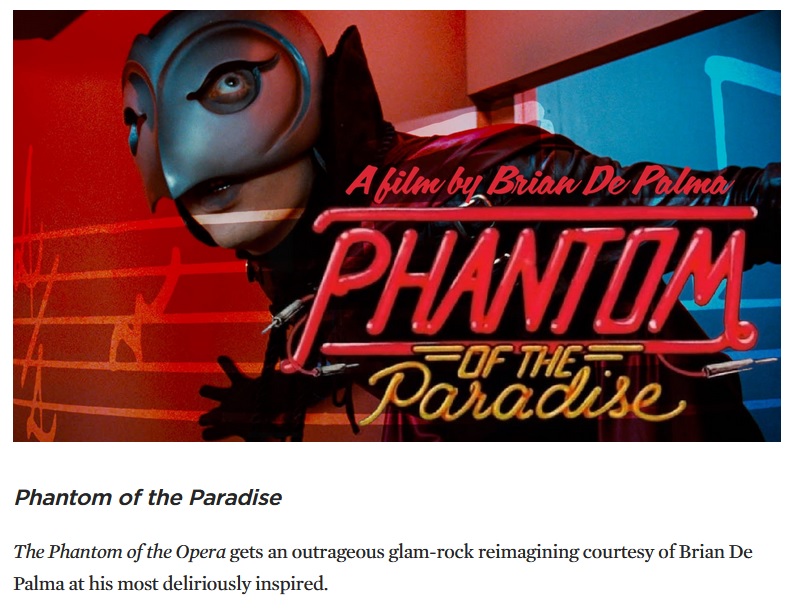
 Hello and welcome to the unofficial Brian De Palma website. Here is the latest news: |
|---|
E-mail
Geoffsongs@aol.com
-------------
Recent Headlines
a la Mod:
Listen to
Donaggio's full score
for Domino online
De Palma/Lehman
rapport at work
in Snakes
De Palma/Lehman
next novel is Terry
De Palma developing
Catch And Kill,
"a horror movie
based on real things
that have happened
in the news"
Supercut video
of De Palma's films
edited by Carl Rodrigue
Washington Post
review of Keesey book
-------------
Exclusive Passion
Interviews:
Brian De Palma
Karoline Herfurth
Leila Rozario
------------
------------
| « | September 2023 | » | ||||
| S | M | T | W | T | F | S |
| 1 | 2 | |||||
| 3 | 4 | 5 | 6 | 7 | 8 | 9 |
| 10 | 11 | 12 | 13 | 14 | 15 | 16 |
| 17 | 18 | 19 | 20 | 21 | 22 | 23 |
| 24 | 25 | 26 | 27 | 28 | 29 | 30 |
De Palma interviewed
in Paris 2002
De Palma discusses
The Black Dahlia 2006

Enthusiasms...
Alfred Hitchcock
The Master Of Suspense
Sergio Leone
and the Infield
Fly Rule
The Filmmaker Who
Came In From The Cold
Jim Emerson on
Greetings & Hi, Mom!
Scarface: Make Way
For The Bad Guy
Deborah Shelton
Official Web Site
Welcome to the
Offices of Death Records
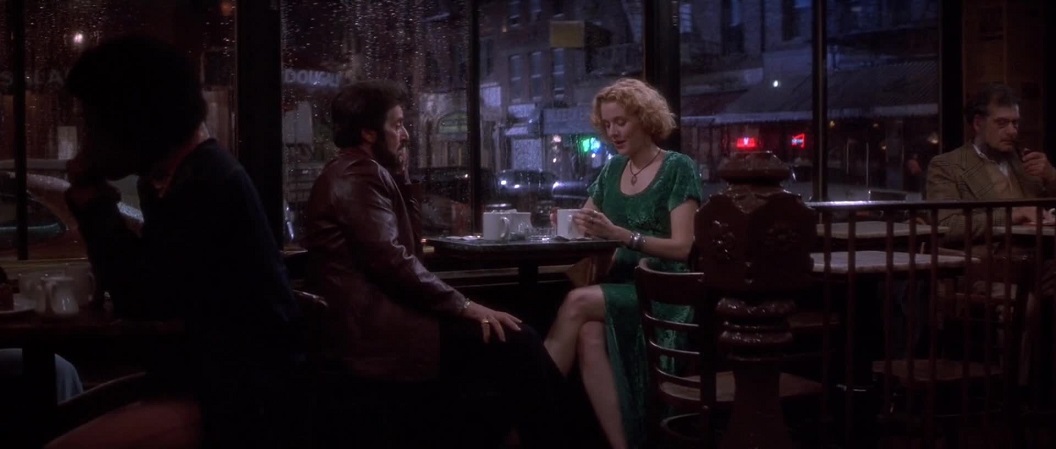
Here's some of what Bowen has to say about the film itself:
The opening credits sequence establishes a different De Palma register—a cohesion between the sentimental pull of pop cinema and the filmmaker’s sense of visual irony. In black and white, we see a man, whom we will soon know is Carlito Brigante (Al Pacino), collapse from a gunshot in a subway station. Carlito falls to the floor, his head tilting toward the ceiling, as his lover, Gail (Penelope Ann Miller), crouches beside him. Patrick Doyle’s operatic score swells, while the camera eases from Carlito’s point of view to float freely above and beyond him, suggesting a spirit on the verge of leaving its body. The prismatic compositions are ravishing and tragic.We’re not told at this point whether or not Carlito dies, though we have a good idea. But the gambit of killing the protagonist within seconds of the opening doesn’t serve the same purpose here as it did in, say, Sunset Boulevard. Billy Wilder used such a beginning to cast an amusing pall of futility on what followed. There’s futility in the opening of Carlito’s Way, but De Palma takes it deadly seriously. Carlito gazes at a billboard on one of the walls inside the subway station showing a picture of a beach and promising “paradise.” It mocks him as he slips away, succumbing to the pull of personal flaws that he’s failed to transcend. One may remember the Nancy Allen character’s death in Blow Out, brought on by a hero who didn’t know as much as he thought, who couldn’t be the person he wanted to be. Carlito dies for similar reasons.
The governing obsession of De Palma’s art is the limitations and failures of people who try to position themselves as heroes. In 1989, he cauterized this obsession with Casualties of War, bringing to a head the impotency that haunts his work. Perhaps that film, followed by two other maligned box office disasters—The Bonfire of the Vanities and the studio-mangled Raising Cain—softened De Palma up for something mellower in its melancholia—decidedly battered and middle-aged in temperament. Or perhaps he’s just a profoundly skilled artist for hire following the cues of a great screenplay. With a film this good, the distinction barely matters.
Carlito’s Way is a confident blend of several types of movies. It’s a crime melodrama, with most of the attendant clichés accounted for and transcended, especially of the last job before retirement from the underworld. It’s a star vehicle, with Pacino riding high at the crest of a resurgence that began with Harold Becker’s superb 1989 thriller Sea of Love and would continue through the 1990s and into the early aughts. It’s also a character study, filled to the brim with actors doing astonishing work—among them Sean Penn, Viggo Mortensen, John Leguizamo, and Luis Guzmán—with an unusual anecdotal structure. Vignettes interlock in surprising fashion, filling in the contours of Puerto Rican gangster Carlito’s life as he emerges from prison and is hit up by everyone for favors. And Carlito’s Way is also, like many a De Palma film before it, a hall of mirrors, with echoes of the filmmaker’s splashier, meaner, less involving Latino Pacino gangster epic, Scarface, and set pieces that explicitly reference The Untouchables, among others, as well as other Pacino films like The Godfather.
Yet Carlito’s Way has an ease and warmth and fluidity that disincline one to play the game of “spot the reference.” Most of De Palma’s films are floridly emotional, even heartbroken, especially those that he made in the 1970s and ’80s. But they’re also sardonic, as you sense someone fucking with you. With these vintage films, De Palma fans in particular are encouraged to get their pipe out and talk semiotics and wrap their brains around symbolism and motifs and overlook the maestro’s empathy for his characters, especially women.
On the other hand, Carlito’s Way, despite its volatility, allows the viewer to let their guard down. It’s glamorous, with Pacino at the zenith of his romantic magnetism, and De Palma knows how to let the audience soak in the soap-operatic bath. That’s why the film is so painful. It’s a dream about the death of dreams. And the filmmakers aren’t shy about articulating this idea either. Late in the film, Carlito lies in bed with Gail, an aspiring dancer and actress who moonlights as a stripper. They’re talking of ambitions. Carlito is going to leave the Harlem hood life behind and rent cars in the Bahamas, and he seems to believe it too. Of her dancing, Gail says, “Yeah, I had a dream once, but now I’m awake, and I hate my dream.”
That line always blindsides me. It’s even more shocking in its directness now, with modern pop cinema constantly pretending to empower us, telling us that we’re girlbosses and superheroes and that shame doesn’t exist despite evidence to the contrary. Gail cuts to the raw root of what haunts most people as they go through their lives, disappointed in themselves, coming not to recognize the mediocrities they feel themselves to be growing into. Her admission complements what are perhaps the most wrenchingly ironic words to be spoken in a De Palma film, when a young woman, a stranger unfamiliar with what has recently befallen him, tells Michael J. Fox’s character at the end of Casualties of War that a bad dream he references is “over now.”
Those words, well-intended, are poignantly inadequate to addressing the savagery that Fox’s character has had to witness and survive. Dreams can die but nightmares can flourish, an understanding brought about by the disillusionment that every De Palma hero experiences. Earlier, brasher De Palma films showed young characters learning this lesson, while Carlito’s Way exists in a defeated purgatorial realm from the outset. It’s a glossier, more approachable vision of the retrospection that courses through Casualties of War. Which isn’t say that the traditions of a gangster movie can be equated with a true-life story of rape and murder during the Vietnam War. But Carlito’s Way suggests that De Palma had returned to sublimating themes into genre in the wake of the general, grossly unjust rejection of Casualties of War. It’s one of those “for hire” works in which an artist finds an unexpected opportunity to get personal.
The maestro still can deliver his traditional goods as well, as there’s enough formal sizzle in Carlito’s Way for five De Palma films. It’s rich in snaking tracking shots that place us in Carlito’s fevered psyche, and in set pieces of a sensual, escalating intensity, particularly the chase inside Grand Central Terminal, with its slashing through lines and winding camera pirouettes. But the quieter effects are more haunting in Carlito’s Way, such as the blasts of expressionist blue hues that engulf Carlito as he spies on Gail’s dance class in the rain from a roof across the street in a sequence that suggests Rear Window reconfigured as a love sonata. Carlito’s Way is firstly a character film as noir opera. De Palma turns the petty disappointments of our lives into a grand myth, rich in the poetry that makes such disappointments bearable.
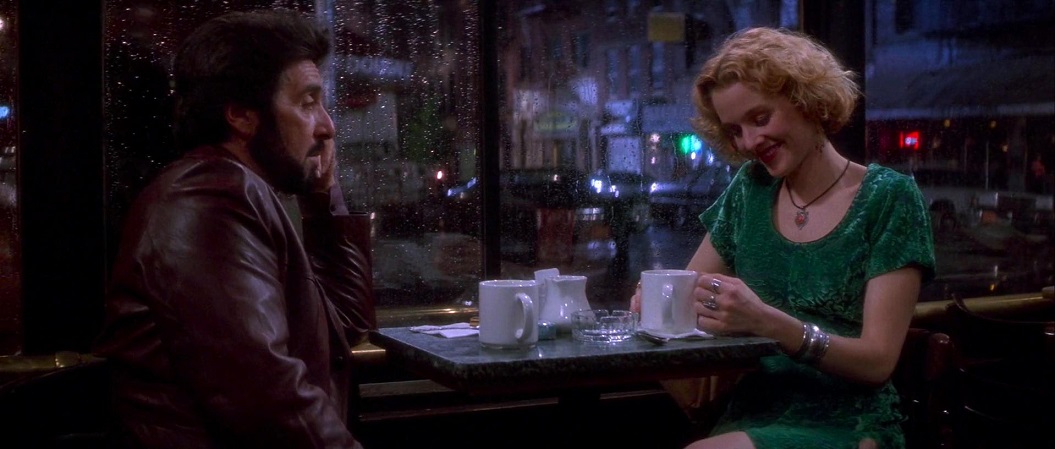
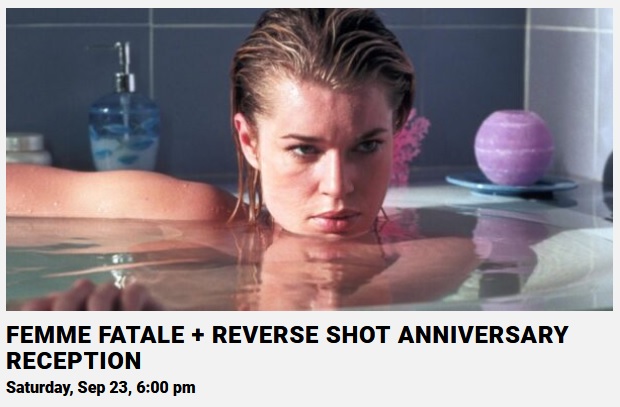
While the film series opens Friday night (Sept. 22) with a screening of Olivier Assayas' Demonlover, this Saturday night's screening of Brian De Palma's Femme Fatale is paired with the Reverse Shot Anniversary Reception, which will take place in the lobby after the movie.
Here's the Museum's description of Femme Fatale:
De Palma’s silky, seductive, ridiculously entertaining meta-noir stars a delightful, committed Romijn-Stamos as a statuesque jewel thief on the run from her fellow criminals after absconding with a stash of diamonds. Yet that simple description could not prepare a first-time viewer (or, frankly, even a tenth-time viewer) for the ecstasy of De Palma’s endlessly looping, self-referential, too-pure-for-camp masterwork, a film that’s a dose of giddy pleasure from its intricate opening heist scene set during the Cannes Film Festival (!) to its mind-bending split-screen shenanigans to its wild alt-reality conclusion.
The entirety of the film hinges on the ability to make sense of visual information and to see things as they are, which is why it’s so brilliant that De Palma constantly puts us in the position of misrecognizing what we’re seeing, despite giving us the clues. Those are the diamonds; that is her conspirator; this is a dream. You just didn’t see it. Fittingly, Laure finally gets the better of the men who are hunting her thanks to literal blindness—a flash of sunlight, refracted through a piece of jewelry, blinds a truck driver who drives the men into the spikes of a metal grate, a most violent and lethal penetration. De Palma, like Hitchcock, is perpetually concerned with the idea of “the gaze”—the gaze of the camera, of the spectator, and of the straight male (all of which may be, in some sense, variations of the same thing)—and with disrupting the equation that to look is to see; to see is to know; and to know is to have power.Shortly before she seduces Nicolas, Laure does a short striptease for a man in the basement of a bar, as Nicolas watches from the other side of the doorway. We see most of the striptease from Nicolas’s point-of-view, as though she’s dancing for his benefit and, by extension, for ours. It’s pure titillation, a softcore cinematic masculine fantasy. Then De Palma turns everything around. The other man loses control and lunges at her, and Nicolas, perhaps out of jealousy or some masculine impulse to protect Laure, jumps and attacks him. We watch her watching them, the fight visible only as a shadow play on the wall. They do their little masculine dance, and she spectates with delight, applauding as it reaches its climax. Perspectives shift—the looked-at does the looking; power dynamics are reconfigured. Fetish becomes critique in this deadly game of transmuting identities and shifting realities, a veritable cinematic hall of mirrors.
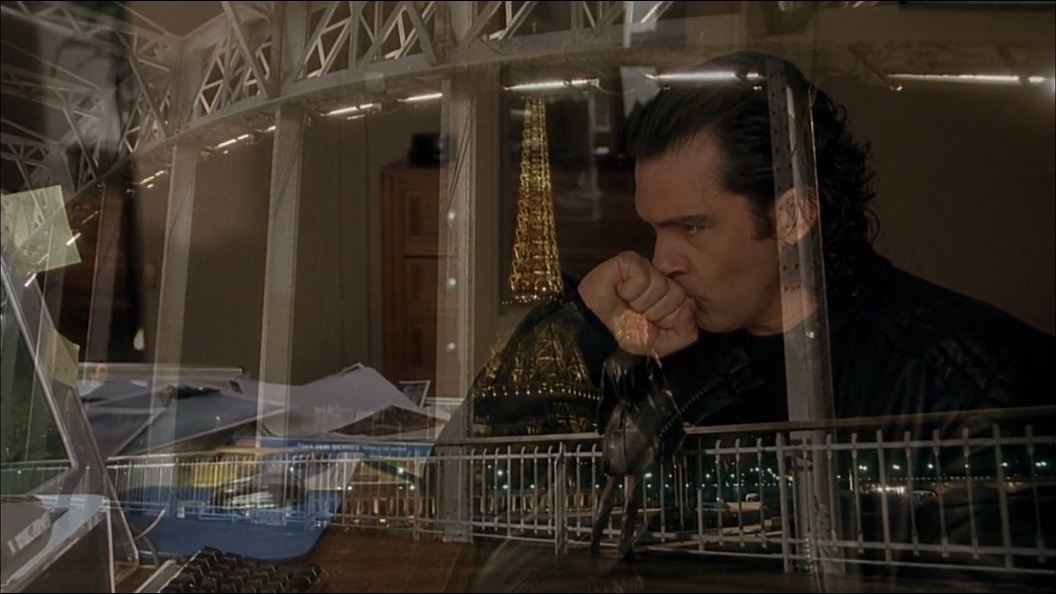

There are movies that are not only hallmarks of our popular culture, but resonate with their audience with such ferocity, that they inspire and influence a generation, for life. Phantom of the Paradise is one of those special movies, and it continues to captivate new generations. All the planets aligned in 1974 with a break-out directorial feat for a young Brian DePalma and his screenplay, a score and songs by the legendary Paul Williams, makeup by FX pioneer John Chambers, and a sexy leather bondage ensemble by Rosanna Norton, worn with finesse by the unforgettable character actor William Finley. All this magic wrapped up in camp and, most notably, Rock & Roll! Small wonder a legion of future filmmakers was mesmerized by this miraculous, modern, monster movie.And as is the case with many off-beat, trend-setting efforts, who could predict the ever-growing cult fandom that would follow this film right up to this day. As much attention and acclaim as the film has earned, it's shocking how little material exists from production. Collectors have been known to pay tens of thousands of dollars just for a replica helmet! There's barely a trace of prop or fabric...until now! This is the screen worn, complete "Winslow / Phantom" costume worn by William Finley in the film, stored away by the actor for nearly half a century, and discovered in perfect condition by Mr. Finley's family after his passing.
Twentieth Century-Fox, 1974. The custom costume includes: 1-leather strap and metal buckle tunic, 1-long sleeved turtleneck under tunic, 1-matching pair of leather buckle pants, 1-pair of leather gloves, 1-pair of leather boots, 1-crushed velvet red and black character cape, 1-black and silver character cape, 1-two-piece cast fiberglass shell visor helmet with one smoked eye lens painted in gunmetal silver, and 1-set of chromed dentures that would slip over the actor's own teeth. The costume even includes the sport socks Finley wore in character. The rarity of this holy grail costume can't be over-emphasized, and provenance is unquestionable.
Other movie-related William Finley treasures available as well. The cornerstone of our Music & Monsters auction can be the cornerstone of your collection!
I somehow had no idea that that was Stephen Bishop, before he became well-known, as one of the people auditioning for Swan...! Earlier today, Bishop shared the post below on his Facebook page:
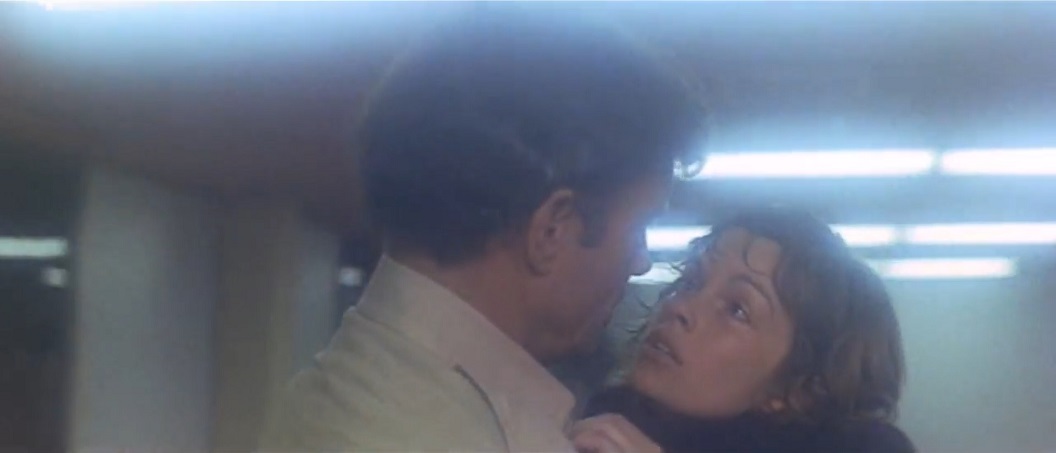
In the following passage, filmbee89 delves into a couple of key moments between technique, score, editing, and performance:
Fast forward to 1975, and Courtland is still very much obsessed with his late wife and often visits a monument he has had built in her memory, a replica of the church (the Basilica di San Miniato al Monte) in Florence, Italy, where the two of them first met. To show the transition of time, De Palma’s cinematographer Vilmos Zsigmond and Paul Hirsch (who frequently collaborated with the director), pan the camera across from Courtland in 1950 then across to the monument and back to Courtland in 1975. Coupled with Bernard Herrmann‘s beautiful but haunting score and the sound of the howling wind, De Palma manages to capture Courtland’s feelings of sorrow, loss and regret.Courtland’s business partner Robert LaSalle (John Lithgow) manages to convince the widower to accompany him on a work trip to Florence. While there, Courtland revisits the church and finds a young woman named Sandra (Bujold) who resembles his late wife. Courtland is very much taken aback by Sandra’s appearance and begins to court her. In a touching scene, Sandra asks Courtland what happened to his wife, and he ‘admits’ that he killed her. Much has been said about Robertson’s performance, but his deadpan delivery helps to reflect how ‘zombie-like’ and ‘out-of-it’ his character is.
Reading up on the final third act proposed by Schrader, I can’t help but think that it would have been a complicated and convoluted third act that ultimately would have completely ruined the emotional impact of the film’s conclusion. (For those interested in reading Schrader’s full three-act script, it was released as part of the Arrow video Blu-ray in 2011).The ending we do receive is gut wrenching and heart-breaking, so much so, that it reduced me to tears. Bujold’s performance in the film’s end scene is so impactful that you’re left reeling once the credits start rolling. She successfully manages to encapsulates the fragile mental condition of her character, and we feel her sense of pain and longing to be be loved unconditionally.
There are a lot of positive aspects to “Obsession” aside from the stunning performance by Bujold. Firstly, the film’s score is magnificent. After the film had been completed, Herrman declared it as the finest film in his musical career. He manages to capture the emotional state of both Courtland and Sandra without being too over-sentimental. Even though Cliff Robertson’s performance is very lacklustre in many scenes, there are moments where he manages to shine, especially in the film’s climax. And, when he does underperform, other aspects of the film such as the score; the editing, the cinematography and Bujold’s performance, manage to save the film from being an utter disaster.
In the 2015 documentary “De Palma” (by directors Jake Paltrow and Noah Baumbach), Brian De Palma stated that he felt the film’s major flaw was the casting of Robertson. He strongly felt that the actor couldn’t capture the anguish of the character and that Robertson was quite difficult to deal with on-set. Apparently, the actor insisted on a dark tanning makeup, inappropriate for his troubled character. It made lighting him so difficult that at one point cinematographer Vilmos Zsigmond shoved him against a wood wall and shouted “You! You are the same colour as this wall!”
De Palma may be dismissive of Robertson’s acting ability but he has sung the praises of Bujold who he felt had the more difficult role, which she played admirably, giving the film the emotional resonance needed for the project. I can’t help but wonder if Robertson felt like he was being overshadowed by Bujold and as a result this impacted his performance. Sandra is by far a more interesting and complex character compared to Michael and I can’t help but wonder if the film would have been more impactful if we had seen more from her point-of-view.
The film was an unexpected financial success. Columbia held on to the movie for almost a year before deciding to release in late August of 1976. August is usually considered the “dog days” of movie attendance, so it was a bit of surprise for the studio, and it earned the distributor over $4 million in domestic (U.S. and Canada) rentals.
Upon its release, the critical reaction was very mixed. Some critics like Roger Ebert sung the film’s praises. He wrote in his review that “Obsession is an overwrought melodrama, and that’s what I like best about it…I don’t just like movies like these; I relish them. Sometimes overwrought excess can be its own reward. If Obsession had been even a little more subtle, had made even a little more sense on some boring logical plane, it wouldn’t have worked at all.” I’m inclined to agree with him, the film works because of its melodrama and its unbelievable plot. With certain films like “Obsession” there must be a suspension of disbelief.
Other critics were quick to compliment the stylish cinematography by Vilmos Zsigmond, and Herrmann’s beautiful, highly romantic score. In fact his score for “Obsession” was one of the more acclaimed in his distinguished career, and earned him a posthumous Academy Award nomination (the composer died in December 1975, a few hours after completing the score of Martin Scorsese’s “Taxi Driver”).
Surprisingly, one of the critics who should have loved “Obsession” turned out to be very dismissive of De Palma’s film. Pauline Kael had praised many of the director’s other films in the past, but she wrote in her review that the film was “no more than an exercise in style, with the camera whirling around nothingness…”. I’m not quite sure why she was so dismissive of “Obsession” but I can reassure you that it is not “an exercise in style” or a “Vertigo” copy-cat, it is very much a film that can stand on its own legs and has plenty of its own uniqueness and beauty. It is well-worth a watch. And, if you happen to get obsessed with it like I did, then I did try to warn you.
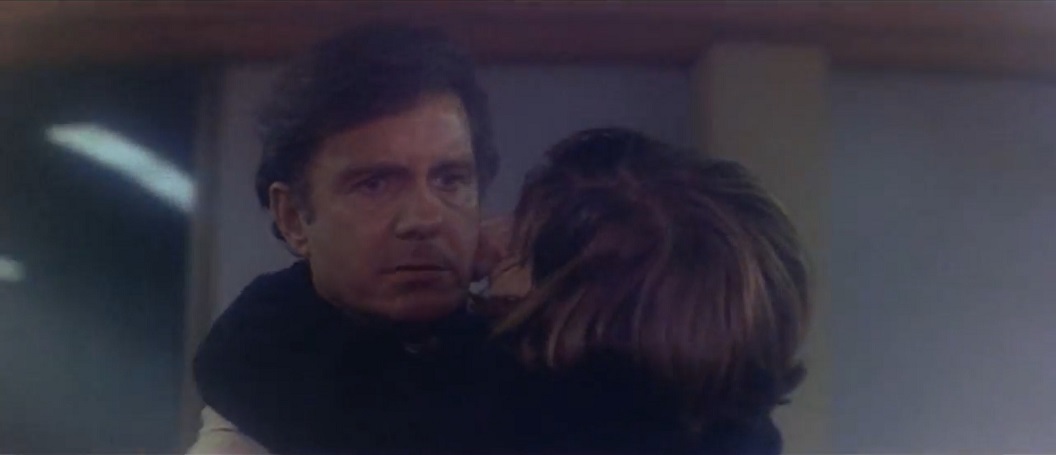
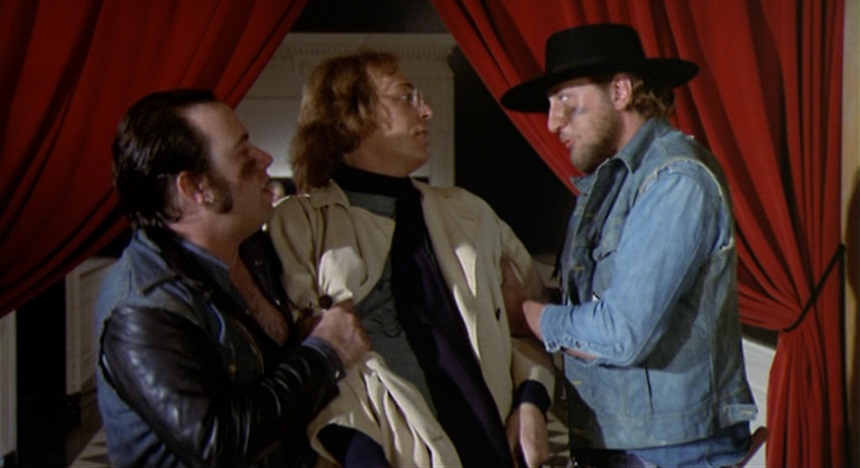

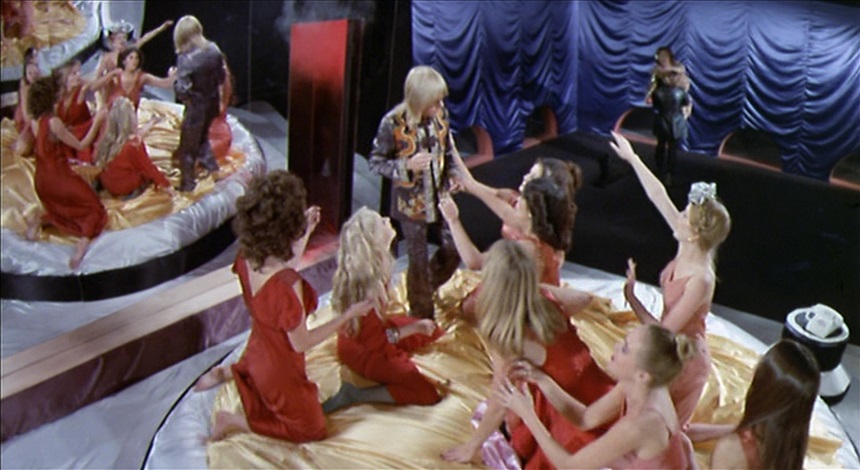


La-La Land Records and Universal Pictures proudly mark the 40th Anniversary of the legendary 1983 big-screen gangster drama SCARFACE, starring Al Pacino and directed by Brian De Palma, with a world premiere vinyl LP release of Academy Award-Winning composer Giorgio Moroder’s (MIDNIGHT EXPRESS, AMERICAN GIGOLO, CAT PEOPLE, FLASHDANCE) original motion picture score.SCARFACE – 40th ANNIVERSARY ORIGINAL SCORE is a limited edition 2XLP 33 rpm pressing on 180 gram colored vinyl that will be available in two exciting variants – “Chainsaw” Red Splatter and “Yeyo” Pure White! This deluxe release is the first time Maestro Moroder’s expanded film score is available on LP – a pitch perfect way to commemorate four decades of this landmark film.
When legendary director Brian De Palma needed the perfect musicscape for his game-changing gangster opus, he called upon renowned composer and electronic and pop music pioneer Giorgio Moroder to deliver – and did Moroder ever deliver… with a groundbreaking and absolutely iconic and influential synth film score.
Produced by Neil S. Bulk and Dan Goldwasser, and mastered in high-resolution by Chris Malone, this expanded LP unleashes Moroder’s classic film score across two records. Each vinyl color variant is limited to 750 units, and the gatefold jacket also houses an eight page insert with liner notes by writer Tim Greiving. The sharp art direction is by Dan Goldwasser. Finally… the world – and Moroder’s music of SCARFACE – is yours!!!

